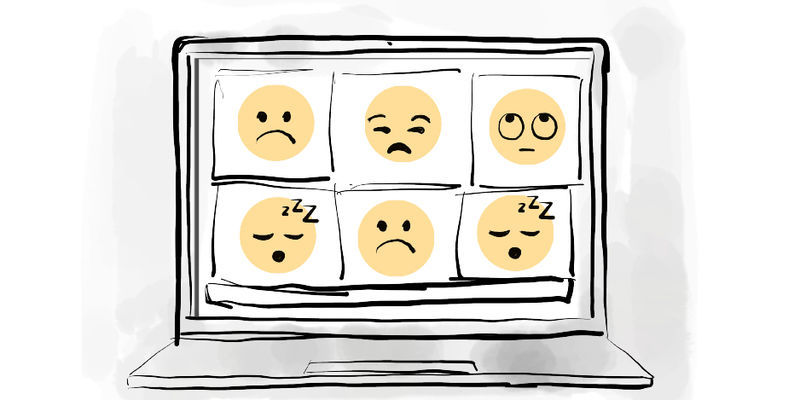Sleep in the age of COVID-19
How the pandemic might be affecting your sleep—and what you can do about it

The coronavirus pandemic has introduced many changes to our day-to-day lives. It’s affected how we attend classes, how we do our jobs, and how we spend time with our friends and family.
For many of us, the pandemic has also affected our sleep.
Quarantine dreams
If you’ve been experiencing odd or even anxious dreams since entering quarantine—dreams that stick with you long after you’ve woken up—rest assured that you’re not alone.
According to Marsha Weinraub, a professor of psychology in the College of Liberal Arts who teaches Topics in Psychology: The Science of Sleep, “That’s a common report. We’re dreaming more and we’re having more anxiety dreams” since COVID-19 hit Philadelphia some months ago.
One of the reasons for this may seem obvious.
“We’re more anxious,” Weinraub said. “We’re living in a time of uncertainty, and uncertainty makes us anxious. We’re learning and trying to cope with that.”
Another reason is that “many of us are sleeping longer, and dreaming occurs later in the sleep cycle,” Weinraub said. “We have light sleep, then deep sleep, then dream sleep.” If you’re not waking up for a commute to work or class, chances are you’re sleeping in a bit longer than usual.
This gives you more time to dream, for better or worse.
Weinraub added, “If you’re not jumping out of bed anymore to get to work, then that’s more time to notice and think about your dreams.”
If you’re experiencing bizarre or distressing dreams, whether or not they’re related to the pandemic, Weinraub recommends learning to accept them.
“These dreams are our brain’s way of coping with anxiety—they are a kind of overnight therapy, and they are highly, highly adaptive,” she said. “The information from our dreaming helps us to make sense of things that are worrying us—and that helps us heal.”
Managing restlessness or insomnia
You might also be experiencing an irregular sleep schedule, for a number of reasons. Maybe you’ve developed new routines to adjust to self-isolation. Maybe you’re staying up later, worrying a bit more, staring at screens a bit longer.
Whatever the reason, Weinraub urges to take measures to get quality rest.
“Sleep is important in helping us remember things, learn things and for emotional regulation,” she said. “If you’re not getting sleep right now, it’s not helpful for your coping mechanisms.”
If you’re experiencing issues falling asleep or staying asleep, Weinraub has a short list of tips to help you relax and get some much-needed shut-eye.
- Keep to a schedule.
We all have an internal clock that tells us when to eat, when to sleep and when to wake up—they are called circadian rhythms. Keeping our clock on a schedule is essential to healthy sleep. Remember to get 15 to 30 minutes of sun in the morning, eat three meals a day at routine hours and avoid caffeine after 2 p.m. - Avoid artificial sleep aids.
If you’re relying on a glass of wine or a pill to drift off every night, you may be depriving yourself of the natural stages of sleep. “Substances including alcohol help us slow down and get to sleep, but they also interfere with REM sleep, so in fact they make us feel worse the next day,” Weinraub said. She added that melatonin is one sleep aid that can be safe and effective, if you use the recommended dosage. - Reduce screen time.
“Almost all of my students have their phones with them in bed or are watching Netflix before they go to bed,” said Weinraub. “These things are arousing rather than relaxing.” Instead, ease yourself into sleep with activities that aren’t reliant on screens, like reading a book. - Lower your body temperature.
“In order to sleep, your body temperature must be about two degrees cooler,” Weinraub said. A relaxing way to lower your body temperature is to take a warm shower before bed. This stimulates your “inner core” to cool down, she said. - Embrace the dark.
“Darkness is our friend,” Weinraub said, but you should ease yourself into it. Instead of leaving all the lights on until bedtime, try gradually dimming the lights in your bedroom around 8 p.m., transitioning slowly and comfortably into total darkness. - If all else fails, get up.
“You should not lie in bed at night ruminating,” said Weinraub. Fixating on the fact that you can’t sleep could only prolong the issue. She recommends getting out of bed and doing something that’s not too arousing: Fold laundry; empty the dishwasher; or listen to a podcast or sleep app. But whatever you do, Weinbraub cautions, avoid watching TV or looking at your phone.
MEDIA CONTACT:
Dutch Godshalk
215-738-7919
dutch@temple.edu


